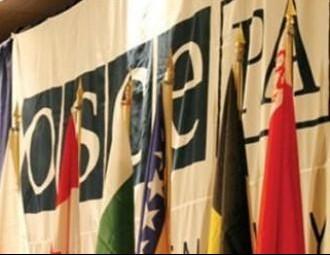Belarusan delegation has attended OSCE Parliamentary Session

Viktar Huminski, Belarusan parliamentary member said that in general Belarus is “on the right track”, as a growing number of members of the OSCE Parliamentary Assembly support Belarusan delegation.
Mr. Huminski and other members of Belarus’ lower parliamentary chamber attended the 22nd annual session of the OSCE Parliamentary Assembly that was held in Istanbul, Turkey, from June 29 to July 3, BelaPAN reports. On July 2, the Assembly adopted a resolution in which it called on the Belarusan government to release and exonerate all political prisoners immediately and unconditionally.
Although this was the Assembly’s third “anti-Belarusan” resolution, its provisions are no different from the provisions of the previous resolutions, Mr. Huminski said. Swedish MP Christian Holm failed to give a coherent explanation for his decision to propose the resolution, he said.
During a discussion, Mr. Holm and two other members of the Assembly spoke in favour of the resolution, while a representative of Belarus and a representative of Russia criticized it, Mr. Huminski said.
Representatives of no more than seven countries voted against the Assembly’s resolutions on Belarus in the past, but now the situation has changed, he said. Members of the Assembly representing Armenia, Azerbaijan, Belarus, the Czech Republic, France, Greece, Kazakhstan, Russia, Serbia, Slovakia, and Ukraine voted against the resolution, and representatives of Canada, Italy, the Czech Republic and France abstained, he said.
Mr. Huminski expressed puzzlement that members of the Kyrgyz and Georgian delegations had voted in favor of the resolution.
“People understand the situation full well,” he said. “No negative comments were made in private conversations. It’s wrong to criticize against the background of what is going on in other states of the OSCE region. Our country has not done anything bad to anyone.”
Mr. Huminski said that in general “we’re on the right track.” “Of course, we also have problems, but no one will goad, boss and control us,” he said. “We have our own mentality, our national interests and we will be them. Our stance was supported on the sidelines.”
In the resolution, the Assembly called on the Belarusan government to “release and exonerate all political prisoners in Belarus, including those given suspended sentences and those whose freedom of movement has been limited, immediately and unconditionally, and to guarantee the full restoration of their civil and political rights.”
The Assembly condemns the fact that political prisoners are denied regular access to their lawyers and relatives and subjected to degrading treatment amounting to torture, the resolution said.
The resolution urged the authorities “to suspend the harassment and persecution of civil society, such as representatives of youth organizations and movements, trade unions, independent media and human rights defenders.”
The nature of human rights violations in Belarus remains structural and endemic, underscored by the centralization of the legislative and executive powers in the office of the president, whose decrees are a key legislative mechanism in the country, undermining the role of the parliament, the resolution said.
-
03.01
-
07.10
-
22.09
-
17.08
-
12.08
-
30.09








































